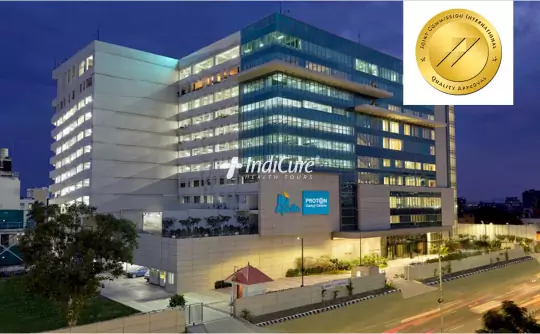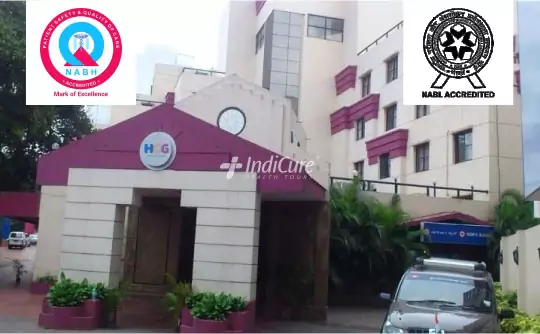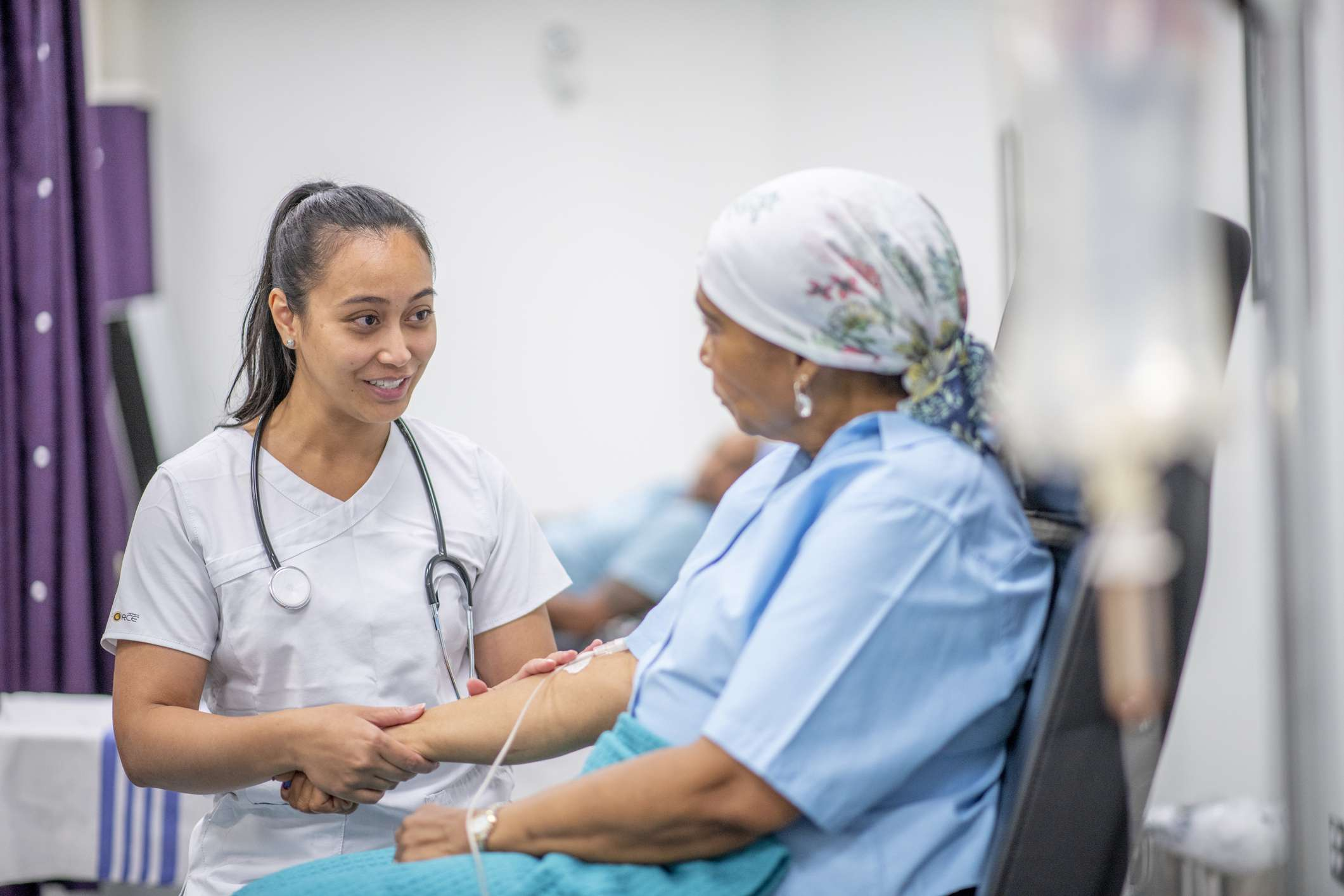

Blood Cancer Treatment Cost in India depends on the type of treatment required, your medical condition, hospital and the city where you choose to get the treatment done.
Typical Costs for Blood Cancer Treatment in India looks like:
| Procedure | Cost (Range in US $) |
|---|---|
| Investigations | 500-1000 |
| Chemotherapy | 500-2000 per cycle |
| Radiotherapy | 3500-5500 |
| Targeted Therapy | 4500-5500 |
| Bone Marrow Transplant | 15,000-18,000 |
An important expense when it comes to your blood cancer treatment is going to be your oncologist's fees. IndiCure recommends highly experienced, skilled, board-certified doctors who are capable of delivering successful treatments. Although the charges may vary depending on the experience of the doctors, you can be assured that you are in safe and skilled hands when you choose cancer treatment in India with IndiCure.
The overall blood cancer treatment cost depends on the number of chemotherapy, radiation, or biological therapy cycles that a patient has to undergo. The number of cycles of chemotherapy, radiation, or biological therapy to kill the cancerous cells varies depending on the stage and medical condition of the patient.
There are different types of therapies, the choice of which depends on the stage or grade of the cancer and the overall health of the patient. But, if all the therapies fail to treat the blood cancer, the doctor may recommend bone marrow transplant or stem cell transplant. This affects the overall cost of blood cancer treatment.
Having your treatment or bone marrow transplant for blood cancer in an accredited surgical facility by skilled and qualified medical staff is a critical factor. Moreover, the geographical location of this facility also affects the quote. But, IndiCure provides you with a projected estimate that will be affordable.
The additional expenses include the pre- and post-surgical expenses. The pre-treatment expenses are associated with the stage of the cancer and medical condition of the patient and thus the number and type of investigations required. Post-treatment expenses may include prescription medications and follow-up consultations.
We at IndiCure, understand that you travel with a budget in mind and do not like to be greeted by surprises after arrival in India. We thus club all these expenses and give you the package cost that is inclusive and affordable at the same time.
Your case manager shall give you an estimated cost of your surgery after discussing your medical reports with the surgeon. The final cost, however, shall be confirmed after your consultation with the surgeon.
In fact, we have Special Negotiated Rates with the Hospitals and you can avail Discounted Rates when you choose to Travel with IndiCure.


We Help you Choose the Right Treatment, Surgeon & Hospital

We Arrange Video/Telephonic Consultation with the Surgeon

We Assist you with Visa & Accommodation

We Receive you at the Airport and Drop you at Hotel/Hospital

We Assist you the at Hospital & Provide Post Operative Support

Apollo Proton Cancer Centre
Chennai
The Apollo Proton Cancer Centre (APCC) is South Asia's and the Middle East's first and only proton therapy centre, as well as India's first JCI-accredited cancer hospital. The APCC includes a completely integrated treatment suite that provides the most advanced surgical, radiation, and medical procedures available. The Centre brings together a remarkable team of clinicians renowned globally in cancer care, in keeping with the Apollo Pillars of Expertise and Excellence.

HCG Hospital
Bangalore
HCG- HealthCare Global Enterprises Ltd, is the specialized chain of hospitals in cancer care headquartered in Bangalore. Founded by Dr. Ajaikumar, a renowned medical and radiation oncologist with 40 years of experience, HCG has 26 centres across India with its largest facility in Bangalore.
HCG Hospital Bangalore is not only the most advanced facility for cancer care in India, it is a Centre of Excellence for most advanced cancer care and research.
Hematological cancer, commonly known as blood cancer, is cancer of the blood cells and organs that make up blood. Blood cancers occur in the bone marrow or lymphatic tissue of the body and have a significant impact on blood cell production and the immunological response of the body.
There are 3 major kinds of blood cancers:
Leukemia is a cancer of white blood cells that begins in the bone marrow, which is where blood cells such as WBCs, which defend us from infections, RBCs, which carry and supply oxygen to all areas of our body, and platelets, which help to clot the blood when an injury, are produced. In leukemia, the bone marrow creates a large number of abnormal white blood cells that do not function normally, expand quickly, and infiltrate regular blood cells, causing problems such as bleeding, anemia, and infections. It can progress and spread to lymph nodes or other organs, causing symptoms.
Acute and chronic leukemia are two different types of leukemia. It can impact only WBCs or cells that normally grow into RBCs, granulocytes, or platelets (Myelogenous leukemia).
Lymphoma is lymphatic system (an key element of the immune system) cancer, especially lymph node cancer (small bean-shaped structures of the lymphatic system that filter out harmful substances). It affects lymphocytes, a type of white blood cell.
Lymphoma is divided into two categories: Hodgkin lymphoma, which is named after the doctor who first discovered the disease, and non-Hodgkin lymphoma, which encompasses approximately 60 other forms of lymphoma.
Hodgkin lymphoma (HL): is an uncommon cancer that affects only around 12% of lymphoma patients. It is a form of lymphoma that seldom spreads to other organs in the body and is regarded as a fairly curable lymphoma. Reed-Sternberg cells, which are big, aberrant lymphocytes that grow in number as illness severity increases, are one of the characteristics that distinguishes HL from other diseases.
Non-Hodgkin lymphoma (NHL): B-lymphocytes (B cells), T-lymphocytes (T cells), and natural killer cells (NK cells) are three types of white blood cells in the lymphatic system that are affected by non-Hodgkin lymphoma (NHL) (NK cells). B-cell lymphomas are the most frequent type of NHL, accounting for up to 85% of all cases. NHL has been known to extend to other organs including the liver, brain, and bone marrow.
Myeloma is a type of cancer that affects the plasma cells, which are lymphocytes that produce antibodies to fight infections. Myeloma weakens your immune system, making you vulnerable to infection.
Plasma cells make up less than 5% of bone marrow in a healthy person. Antibodies are produced by plasma cells to battle a variety of infections that your body may face. Abnormal plasma cells, also known as myeloma cells, can build up in the bone marrow and crowd out healthy cells, resulting in low blood levels, bone weakening, and fracture risk.
Multiple Myeloma is a type of blood cancer that is named from the fact that it affects multiple parts of the body. The bones are frequently afflicted, although soft tissues are occasionally involved as well. Plasmacytoma is a disorder that refers to myeloma cells that affect only one portion of the body, and treatment for plasmacytoma is frequently limited to that one location.
It is difficult to pinpoint the exact cause, but doctors say that the following are strongly suspected causes that may result in developing blood cancer;
The symptoms of blood cancer vary by disease, but the usual symptoms of blood cancer are:
If you are suffering from any of the above mentioned symptoms, you should see a doctor immediately who would advise tests to confirm the diagnosis. If you are diagnosed with blood cancer, you need to start the treatment immediately.
Blood cancer can be treated in a variety of ways. Depending on the patient's medical state, the treating doctor will recommend the best treatment or a combination of following treatments:
Bone marrow transplantation is a difficult and lengthy procedure. Because the procedure carries its own share of risks and problems, it is only suggested for a limited few individuals who have failed to respond to conventional treatments.
If other therapies have failed and there is a high chance of the illness recurring without the transplant, a bone marrow transplant is advised. Bone marrow transplant is recommended if the physician believes the benefits of the transplant outweigh the hazards of the operation. Those who are in generally good condition and have stem cells from a sibling or another family member with the same tissue type are the greatest candidates for a bone marrow transplant.
We at IndiCure completely understand your concerns and it is always our endeavor to provide the best outcome for every patient. Following is the list of questions you must ask before you embark on your journey for Blood Cancer Treatment in India.
Prepare to answer questions about your:

Bone marrow transplantation, also known as stem cell transplantation, is a multi-stage surgery. Following are the most important steps followed during bone marrow transplant:
This is done to see if the patient is in a good condition to have a bone marrow transplant. To ensure that the patient can accept the transplant, several tests are performed on key organs such as the lungs, kidneys, heart, and liver.
Regardless of whether the transplant is allogenic or autologous, the technique of extracting bone marrow cells is the same. This procedure is carried out under general anesthesia. The needle is first introduced into the cavity of the backside of the hip bone or the iliac crest to collect bone marrow. This is where a considerable amount of bone marrow can be found. In the case of autologous transplant, the bone marrow is cleansed to eliminate any malignant cells, or removed for T cells to prevent rejection in the case of allogeneic transplant, and frozen at a temperature of -80 to -196 degrees.
Chemotherapy and/or radiation may be used to eliminate malignant cells and make room for fresh bone marrow.
Bone marrow transplantation is performed 1-2 days following the last chemotherapy or radiation treatment session. The collected stem cells are administered intravenously, just like any other blood product, after transplantation. The patient is checked frequently for indications of fever, chills, hives, or chest pain. The days of waiting begin as soon as the transplant is performed.
Because heavy doses of chemotherapy/radiation have destroyed the patient's bone marrow, limiting the body's immune system, the first two to four weeks after a bone marrow transplant are important. The patient is highly prone to infection and heavy bleeding until the new marrow migrates to cavities of the major bones and begins to produce normal cells. The patient is given many antibiotics, blood transfusions, and platelet transfusions.
Additional drugs to prevent rejection are administered in the case of an allogeneic transplant. In order to avoid infection, extreme precautions are required. The patient is regularly checked to see if engraftment has taken place and to keep track of organ function. Transfusions are halted after the healthy bone marrow begins to create normal cells.
In recent years, treatment outcomes following a bone marrow transplant have improved. It is a life-saving treatment, and a successful transplant can save a person's life who would otherwise die of the disease.
The recovery from a bone marrow transplant is long and stressful, both physically and emotionally, for the patient and the family as well. The first 100 days are crucial, as there is a high risk of problems or transplant rejection. During this time, patients are closely observed. For the first several weeks after the transplant, the patient feels tired, weak, and unable to concentrate. It could take a year or two for you to fully recover.
Blood cancer risk factors are unknown, although it is thought that blood cancers are caused by a combination of genetic and environmental factors.
Some types of blood cancers have been associated with smoking, radiation exposure, and exposure to chemicals like benzene (a frequently used industrial chemical). Infections with the Epstein-Barr virus, HIV, and the human T-cell lymphoma/leukemia virus are also risk factors for lymphomas and leukemias.
There are various reasons why having too many leukemia cells is harmful:
In the United States, leukemia is the tenth most frequent cancer, accounting for 3.2 percent of all new cancer cases. Anyone can get leukemia, although it's more likely in persons who are:
When the DNA of a single cell in your bone marrow changes, leukemia develops (mutates). DNA is the "instruction code" that instructs a cell on how to grow, mature, and die. Leukemia cells continue to multiply as a result of the mutation, or coding error. The mutated DNA is present in all cells derived from the initial mutant cell.
Scientists are baffled as to why these growing cells mutate. They were able to discover certain common mutations among persons who have been diagnosed with various forms of leukemia.
Leukemia can strike anyone at any time. Nonetheless, studies have found that some factors make you more susceptible to the disease than others. These are:
Previous treatment for cancer: Some varieties of leukemia may be more likely to develop if you've had previous cancer treatments that included radiation or chemotherapy.
Smoking: If you've ever smoked or been exposed to secondhand smoke, you're more likely to get acute myelogenous leukemia.
Chemicals used in the manufacturing process: Cancer-causing compounds such as benzene and formaldehyde can be found in building materials and home chemicals. Plastics, rubbers, dyes, insecticides, pharmaceuticals, and detergents all contain benzene. Building materials and home items such as soaps, shampoos, and cleaning products contain formaldehyde, which can be a cause for cancer.
Certain genetic conditions: Neurofibromatosis, Klinefelter syndrome, Schwachman-Diamond syndrome, and Down syndrome are among genetic conditions that can raise your risk.
Leukemia runs in the family: Some kinds of leukemia, according to research, may run in families. Having a relative with leukemia, on the other hand, does not always guarantee that you or another family member will have the disease. If you or a family member has a genetic issue, tell your healthcare professional. They might suggest genetic testing to determine your risk.
Routine blood tests can tell your doctor that you may have an acute or chronic form of leukemia that necessitates additional testing. If you have leukemia symptoms, they may offer a test.
The following are examples of diagnostic exams and tests:
Physical exam: Your doctor will ask about your symptoms and examine you for swollen lymph nodes, an enlarged spleen, or an enlarged liver. They may also check for bleeding and swelling in your gums. They may search for a leukemia-related skin rash that is red, purple, or brown in color.
A complete blood count (CBC) tells your doctor if you have abnormal numbers of red blood cells, white blood cells, or platelets in your blood. White blood cell counts will most likely be greater than normal if you have leukemia.
Additional blood samples may be taken to look for indicators that suggest the existence of leukemia cells or a specific type of leukemia, according to your healthcare practitioner. Additional tests that your healthcare professional may conduct include flow cytometry and a peripheral blood smear.
Bone Marrow Biopsy: If you have an abnormal white blood cell count, your healthcare professional may perform a bone marrow biopsy (bone marrow aspiration). During the procedure, a large needle is placed into your bone marrow (typically in your pelvic bone) to pull out fluid. A lab examines the fluid sample for leukemia cells. A bone marrow biopsy can assist confirm a leukemia diagnosis by determining the percentage of abnormal cells in your bone marrow.
Radiology Tests: If your symptoms indicate that leukemia has impacted your bones, organs, or tissue, your doctor may perform a chest X-ray, CT scan, or magnetic resonance imaging (MRI) scan.
Lumbar Puncture: Your healthcare practitioner may do a lumbar puncture (spinal tap) to examine if leukemia has spread to the spinal fluid around your brain and spinal cord.
Because everyone's experience with leukemia is different, it's difficult to anticipate the prognosis. The following are some of the factors that influence the outcome:
Mutations or genetic anomalies: The most important predictor of outcome is the mutations found inside leukemia cells.
Type of leukemia: Certain forms of leukemia are linked to a better prognosis than others.
Blood Cell Counts: At the time of diagnosis, blood cell counts are taken. The quantity of leukemia cells in your body at the time of diagnosis can affect your prognosis.
Age: In general, the younger you are when you are diagnosed, the greater your chances are of a positive outcome.
Health: In general, the healthier you are at the time of your diagnosis, the better are the chances of recovery.
Treatment response: The time it takes for cancer to go into remission is frequently a good indicator of how effective treatment will be.
Finally, the most dependable resource for knowing how your cancer affects your particular prognosis is your healthcare professional. Check with him/her about your treatment outcomes.
Although there is no treatment for leukemia, some people do experience long-term remission. Being cured of leukemia indicates that the cancer is no longer there, that it will not return, and that no further treatment is required - but with leukemia, it's difficult to know for sure.
Long-term remission, on the other hand, means there is no evidence of cancer, regardless of treatment. Remission might extend from a few weeks to several years. It's possible that the leukemia will never return. If this is the case, your doctor may suggest additional treatments to help you achieve remission.
Whether you are cured of my leukemia is the question best answered by your healthcare team. Your team will work closely with you to keep track of your health and build a treatment plan that is unique to you.
Although the number of new cases of leukemia has stayed stable or slightly increased in the United States during the 1970s, the survival rate has improved. Long-term consequences, however, differ from person to person.
For the four primary kinds of leukemia, the National Cancer Institute gives the following survival data:
| Type of Leukemia | Acute Lymphocytic leukemia (ALL) | Acute Myelogenous Leukemia (AML) | Chronic Lymphocytic Leukemia (CLL) | Chronic Myelogenous Leukemia (CML) |
|---|---|---|---|---|
| 5- year survival rate | 69.9% | 29.5% | 87.2% | 70.6% |
| Number of deaths per 100,000 persons | 0.4 | 2.7 | 1.1 | 0.3 |
| Death is highest among those aged | 65-84 | 65+ | 75+ | 75+ |
Data source: SEER Cancer Statistics Review, 1975-2017, National Cancer Institute. Bethesda, MD.
Make your medical trip to India even more comfortable and complete with our range of additional services, designed to take care of all your needs beyond the hospital.
Traveling abroad for medical reasons can be challenging if you are alone, but with IndiCure by your side, it doesn't have to be. With over fifteen years of experience and an exclusively curated network of India's best surgeons and top hospitals, we make your medical tour to India easier and safer. We will guide you at every step, handling all the end-to-end arrangements for your surgery, travel, and stay.
Ramandeep Dhaliwal
a month ago
I had great experience having rhinoplasty through Indicure. Dr. Ruchika from Indicure has helped me in finding best plastic surgeon, answering all my questions...
Ramandeep Dhaliwal's Full Review
Joshua Archer
3 months ago
My name is Joshua Archer I'm from New Zealand, bay of plenty, kawerau I opted for the bypass surgery in January 2023 but planned it in advance for 28 September found IndiCure...
Joshua Archer's Full Review
Kera Ren
8 months ago
Absolutely loved my experience with IndiCure - from first inquiring to meeting the surgeon pre op to my follow up post op. The surgeon was extremely approachable...
Kera Ren's Full Review
Andreana Paul
5 months ago
Had a wonderful experience. Visited India for my plastic surgery. From sending mails, airport pickup, comfortable accommodation and, to smooth hospital appointment booking...
Andreana Paul's Full Review
Brandi Luce
5 months ago
I had the privilege of using Indicure's services for a cosmetic procedure that I had wanted for a long time but had always been apprehensive about. Ruchika helped me...
Brandi Luce's Full Review
Jade M
3 years ago
Indicure Health Tours went above and beyond my expectations. They helped me with every aspect of my journey and were professional, kind and caring. I was...
Jade M's Full Review
The content on the website (www.indicure.com) is intended to be general information and is provided only as a service. All photographs on our website of before and after results are examples only, and do not constitute an implied or any other kind of certainty for the result of surgery.
Learn about IndiCure Health Tours' comprehensive editorial policy that strives to deliver trustworthy, helpful, relevant, accurate and people-first content on medical tourism in India.
It is not medical advice and should not be taken as medical advice. It should not be used to diagnose or treat a health condition and is in no way meant to be a substitute for professional medical care. You are advised to see a surgeon in person to assess what surgery may or may not accomplish for you.
It is also important to keep your expectations realistic and to understand that all surgical procedures carry risks and should never be taken lightly.